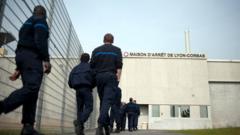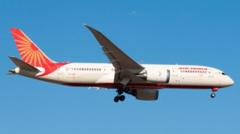The aviation community is closely monitoring the crash of a Jeju Air Boeing 737-800 in South Korea, a model widely used worldwide. Investigators are exploring factors such as maintenance issues and possible bird strikes as they determine the cause.
Investigation Underway Following Crash of Jeju Air's Boeing 737-800 in South Korea

Investigation Underway Following Crash of Jeju Air's Boeing 737-800 in South Korea
A recent crash involving a Jeju Air Boeing 737-800 has ignited investigations into the safety protocols and potential causes.
The Jeju Air Boeing 737-800 aircraft, which recently crashed in southwestern South Korea, has raised significant concerns within the aviation industry. The Boeing 737-800 is a prevalent model, currently in operation by nearly 200 airlines globally, making up about 15 percent of the world’s fleet, with approximately 4,400 units in service according to aviation data provider Cirium.
This particular aircraft model is part of Boeing's Next-Generation 737 family and predates the modern 737 Max, which faced scrutiny and grounding due to two fatal incidents over five years ago. Cirium’s data indicates that the 737-800 is extensively utilized in regions such as Asia, Europe, and North America, with Jeju Air being one of five South Korean airlines to operate this model.
Aviation safety experts have labeled the 737-800 as a generally safe and reliable aircraft. Najmedin Meshkati, an engineering professor at the University of Southern California, remarked on its good safety record, noting that the age of the global 737-800 fleet ranges from 5 to over 27 years, with the crashed plane being approximately 15 years old.
Currently, officials are investigating the crash, focusing on possible causes like a bird strike potentially leading to a malfunction in the landing gear. Bird strikes, while relatively common in aviation, can result in issues like cracked windshields. Airports like Muan International utilize various methods to mitigate bird risks, including audio distress signals and, in some cases, culling.
While Mr. Meshkati emphasized the 737-800's well-designed landing gear and historical reliability, he noted that maintenance is critical, as deficiencies can affect aircraft performance. He urged caution in drawing conclusions from the crash, emphasizing that multiple factors often contribute to aviation accidents, necessitating thorough investigations to uncover the truth.
The situation remains fluid, with Boeing expressing readiness to assist Jeju Air throughout the investigation process as they strive to uncover the circumstances surrounding the incident.






















